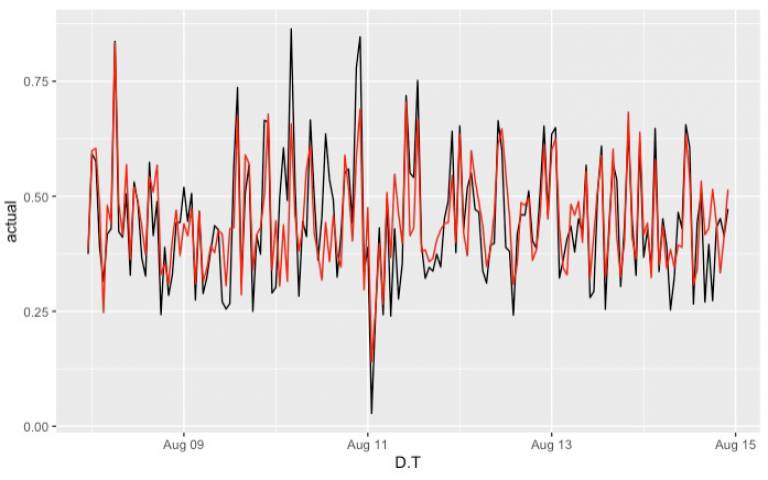Students publish their innovative data science and machine learning in the energy system online
17 February 2021
From arctic ice forecasting to rapid charger placement for electrics taxis in London, our ESDA MSc students have published online their own ideas for applying of data science and machine learning in the energy system.

Image: Demand forcasting graph from Team White on Electricity Demand and On Site wind forecasting
Our Energy Systems and Data Analytics MSc students have published online their ideas for applying data science and machine learning within the energy systems as part of their ‘Energy Data Analytics’ module. The students formed teams of four and worked for about 5 weeks to develop their own idea.
Dr Aidan O’Sullivan, Programme Lead for Energy Systems and Data Analytics MSc, said:
“This year’s projects have been some of the most creative and diverse ideas we’ve seen on the course, from using machine learning to predict changes in sea-ice to finding the best locations for EV chargers in London. The progress students have made in the first term has been exceptional and it’s really rewarding to see the data science and machine learning skills they’ve worked so hard to develop used to explore their interests and tackle decarbonisation challenges and climate change issues. Special thanks to last year’s graduates Oliver Paul, Tom Falconer and Felipe Riquelme Larenas, who mentored the groups throughout their projects.”
Student's projects
Team Blue: Rapid charger placement for electric taxis in Greater London: A density driven approach
In the context of Greater London's goal of having an 100% electric taxi fleet by 2033, this project sought to locate a network of rapid charging points in London accordance with taxi charging demand. Using a weighted cost function and greedy algorithm that accounted for taxi density, users' time cost, distance to the nearest charging point, and the cost of electricity generation, our research was able to reasonably estimate the number and placement of charging points for current and future levels of charging demand.
Team Green: German solar data analysis
Team Pink: EPC Ratings in Greater London and fuel poverty
This project aimed to determine a spatial relationship between low building efficiency, represented by a building's EPC rating, and high fuel poverty rates in Greater London. Students used data from the London Building Stock Model (Created by UCL Enegry Institute for the Greater London Authority). Using a combination of data for buildings with and without EPC ratings they developed machine learning (ML) algorithms to help predict the EPC rating of uncertified buildings. They then used the location data of the known and predicted EPC ratings to identify regions in Greater London that suffer from high rates of fuel poverty and consist of higher concentrations of inefficient buildings. Once these regions were identified, further investigations could be carried out to determine if poor building efficiency contributes significantly to its fuel poverty.
 Close
Close


